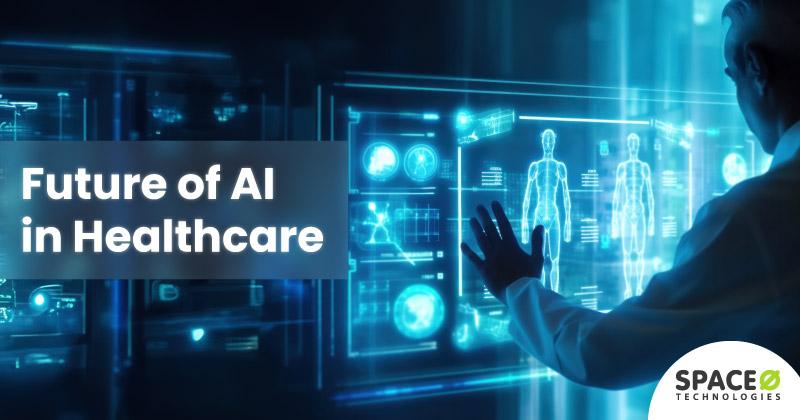

Imagine a world where doctors have access to a virtual assistant that can instantly analyze patient data, predict diseases, and offer personalized treatment plans.
Picture a healthcare system where medical professionals can harness the power of AI technology to enhance patient care, streamline operations, and reduce costs. The future of AI in healthcare is not a distant dream but a rapidly evolving reality.
In this article, we will explore the transformative potential of AI in healthcare, providing key insights into how this technology is reshaping the industry.
Contents
Before diving into the future, let’s first grasp the present landscape of AI in healthcare. AI is already making significant strides in various areas, including
Want to Build an AI-powered Healthcare Solution?
Our team of AI experts specializes in creating customized healthcare solutions, catering to both startups and enterprises.
Now, let’s delve into the future of AI in healthcare and explore key insights into how AI will continue to transform the industry.
Here are the key insights of the future of AI in healthcare.
The integration of AI into Electronic Health Records (EHRs) will revolutionize how healthcare providers access and utilize patient data. Here’s what you can expect:
| Key Insight | Description |
|---|---|
| Improved Data Accessibility | AI will enable instant access to relevant patient data, helping clinicians make informed decisions quickly. |
| Predictive Diagnostics | EHRs powered by AI will provide real-time disease prediction and prevention recommendations. |
| Enhanced Population Health Management | Healthcare organizations can identify at-risk populations and allocate resources efficiently. |
| Reduced Documentation Burden | AI will automate documentation, allowing doctors to spend more time with patients. |
| Interoperability | AI-driven EHRs will seamlessly integrate with other healthcare systems, ensuring the flow of patient information. |
The integration of AI into EHRs promises to streamline healthcare workflows and improve patient care through real-time data access and predictive diagnostics, which are prominent AI use cases in the healthcare industry.
Radiology and medical imaging are areas where AI has already demonstrated remarkable potential. Here’s how AI will further transform this field:
| Key Insight | Description |
|---|---|
| Faster and More Accurate Diagnoses | AI algorithms will continue to improve the speed and accuracy of image analysis, leading to earlier disease detection. |
| Enhanced Workflow Efficiency | Radiologists can benefit from AI assistance in triaging cases, reducing their workload, and improving turnaround times. |
| Improved Accessibility | Telemedicine will rely on AI-powered imaging tools for remote diagnostics, making healthcare more accessible globally. |
AI-powered imaging promises faster and more precise diagnoses, reducing the time to treatment and enhancing accessibility, particularly in remote areas.
The pharmaceutical industry is on the cusp of a revolution with AI-driven drug discovery:
| Key Insight | Description |
|---|---|
| Accelerated Drug Development | AI can analyze massive datasets to identify potential drug candidates, significantly reducing development timelines. |
| Personalized Treatment Plans | AI will continue to refine personalized medicine by considering a patient’s unique genetic and biological profile. |
| Targeted Therapies | AI helps identify biomarkers for specific diseases, enabling the development of highly targeted therapies. |
| Drug Safety Monitoring | Real-time monitoring of drug safety using AI algorithms will enhance patient safety. |
AI-driven drug discovery and personalized medicine promise to revolutionize treatments, making them more targeted, effective, and safe for patients.
AI-powered virtual health assistants are becoming increasingly sophisticated, providing tangible examples of using AI transcription in healthcare:
| Key Insight | Description |
|---|---|
| Improved Patient Engagement | Virtual assistants will engage patients in their healthcare journey, offering guidance and support. |
| Medication Adherence | AI-driven reminders and education will enhance medication adherence, leading to better outcomes. |
| Remote Monitoring | Virtual assistants will collect and analyze patient data, providing timely alerts for medical intervention. |
AI-powered virtual health assistants are set to improve patient engagement, adherence, and remote monitoring, enhancing overall healthcare outcomes.
As AI becomes more prevalent in healthcare, ethical considerations and regulations will play a crucial role:
| Key Insight | Description |
|---|---|
| Data Privacy | Protecting patient data and ensuring its ethical use will remain a top priority. |
| Transparency | AI algorithms must be transparent and explainable to gain trust among healthcare professionals and patients. |
| Regulatory Frameworks | Governments and international bodies will develop comprehensive regulations to ensure the responsible use of AI in healthcare. |
| Ethical AI Bias | Addressing and mitigating biases in AI algorithms to ensure equitable healthcare outcomes will be an ongoing challenge. |
As AI’s role in healthcare grows, ethical considerations and robust regulations will be crucial to protect patient privacy and ensure fair and transparent use.
Hire AI Developers for Your Healthcare Projects
Our dedicated developers are experts at using artificial intelligence (AI), and crafting powerful solutions with outstanding return on investment (ROI).
Now that we have explored these key insights into the future of AI in healthcare, let’s delve deeper into the challenges that must be overcome to fully realize the potential of AI in healthcare.
While the future of AI in healthcare holds immense promise, it also presents several challenges that need to be addressed. These challenges are crucial to consider as we navigate the evolving landscape of healthcare technology.
High-quality data is essential for effective AI in healthcare. Inaccurate or incomplete datasets can lead to unreliable diagnoses and treatment recommendations.
Solution
Healthcare organizations must invest in robust data collection, cleaning, and storage infrastructure to ensure data quality. Additionally, they must implement strict data security measures to protect patient privacy.
Integrating AI systems into existing healthcare infrastructure can be complex and costly. Legacy systems may not be compatible with new AI technologies.
Solution
Healthcare facilities need to allocate resources for IT expertise and invest in interoperability solutions to ensure seamless communication between AI systems and other healthcare tools.
The regulatory landscape for AI in healthcare is evolving. Healthcare organizations must navigate complex guidelines and standards.
Solution
Staying informed about regulatory changes and establishing compliance frameworks is essential. Organizations must adapt their practices to align with ethical and legal standards.
Ethical considerations surrounding AI in healthcare are multifaceted, including concerns about patient privacy, bias in algorithms, and informed consent.
Solution
Healthcare professionals and organizations must uphold ethical principles while harnessing AI’s potential. Addressing algorithmic bias and ensuring patient consent are crucial steps.
The widespread adoption of AI in healthcare requires the workforce to adapt to new roles and responsibilities.
Solution
Comprehensive change management strategies and education programs are necessary to help healthcare professionals transition into roles that complement AI systems.
These challenges, while significant, are not insurmountable. By addressing them proactively, healthcare organizations and professionals can maximize the benefits of AI while ensuring patient safety, data privacy, and ethical integrity in the healthcare industry. Now, let’s discuss FAQs about AI in healthcare.
Yes, AI in healthcare can be safe and secure when proper measures are in place.
This includes compliance with data privacy regulations (e.g., HIPAA, GDPR), robust cybersecurity, ethical AI development, transparent algorithms, ongoing monitoring, human oversight, secure data storage, user training, and patient consent. These steps ensure patient data privacy and the trustworthy use of AI in healthcare, ultimately improving patient care.
AI is poised to positively impact healthcare costs. Here’s how:
No, AI cannot replace human doctors entirely.
While AI can assist in diagnostics, treatment recommendations, and data analysis, it lacks empathy, nuanced decision-making, and the ability to handle complex and unpredictable medical situations that human doctors possess.
Instead, AI should complement human expertise, enhancing healthcare delivery, improving accuracy, and freeing up time for doctors to focus on patient care and complex cases where their skills are indispensable.
In conclusion, the future of AI in healthcare holds immense promise. It’s a future where technology enhances patient care, streamlines processes, and makes healthcare more accessible. To realize this potential, collaboration between healthcare professionals, policymakers, and technology innovators is crucial.
As we look ahead to this AI-enabled healthcare future, staying informed and embracing the transformative power of AI will be essential. With each passing day, we’re moving closer to a healthcare landscape where AI becomes a trusted partner in improving our well-being. It’s a journey that promises healthier lives for all.
What to read next